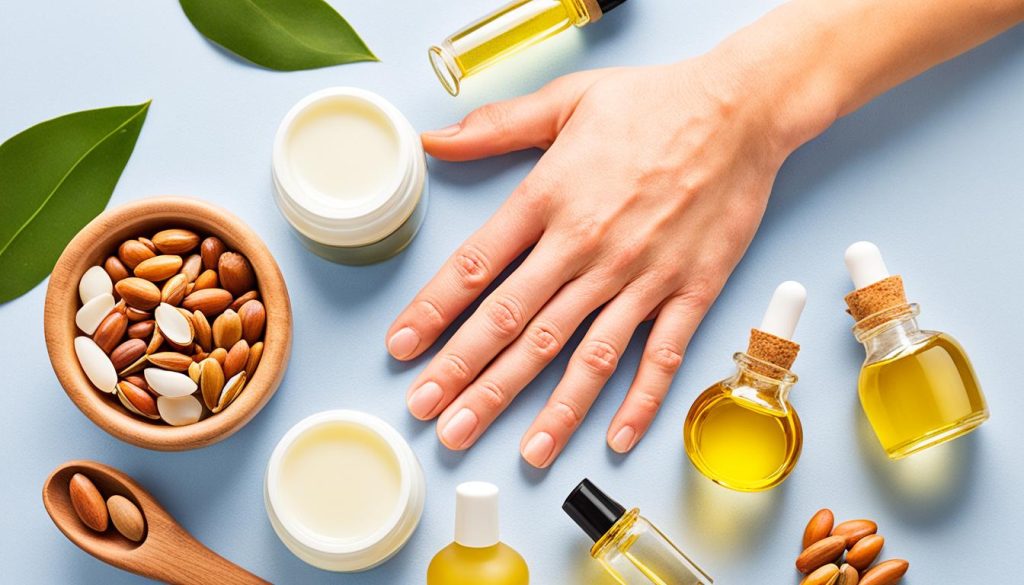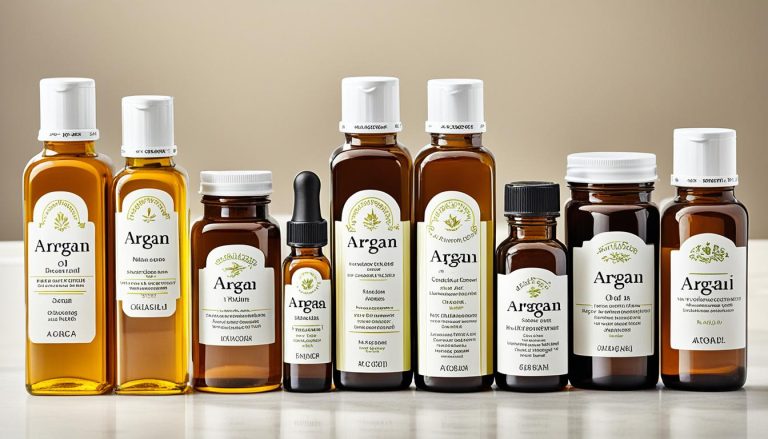Can You Use Argan Oil On Eczema?

Argan oil is often called “liquid gold” for its rich, hydrating benefits. It comes from Morocco, where it’s long been used for eating and beauty, including skin care. People worldwide are now exploring it for treating skin issues, including eczema.
There isn’t much scientific proof yet, but those who’ve tried it share positive stories. They say the oil’s antioxidant and anti-inflammatory features may help with eczema. Its high vitamin E content is good for healing the skin and keeping it moist, vital for eczema sufferers.
Key Takeaways
- Argan oil is often referred to as “liquid gold” due to its moisturizing properties.
- Originating from Morocco, it is valued for both culinary and cosmetic benefits.
- Anecdotal evidence suggests it may help soothe eczema symptoms.
- Argan oil contains high levels of vitamin E, which helps in skin healing and moisture retention.
- Despite limited scientific backing, its antioxidant and anti-inflammatory properties are promising for dermatitis relief.
What is Argan Oil?
Argan oil produced from the nuts of the Moroccan argan tree and is known as “liquid gold.” It’s loved for its luxury and value. Rich in vitamins and antioxidants, it’s great for hair and skin care. Producing argan oil is hard work – it takes about 40 kilograms of dried fruit to make just one liter. Yet, its amazing benefits keep it in high demand worldwide.
Argan oil is famous for boosting skin health. It helps keep the skin moisturized and protects against damage from free radicals. These radicals can harm the skin and speed up aging. With bioactive compounds, argan oil is a top choice for treating skin issues and encouraging skin health. This makes the complex process of making argan oil worth it, as it remains a sought-after beauty product.
Benefits of Argan Oil for Eczema
Argan oil can help those with eczema due to its antioxidant and anti-inflammatory properties. While more research is needed, early studies suggest it could help. It might improve skin moisture and make the skin more elastic.
 Those with atopic dermatitis have seen promising results. This shows argan oil could be a good way to ease eczema symptoms. A lot of argan oil’s power comes from its high vitamin E content. This is great for keeping the skin moist and helping it heal.
Those with atopic dermatitis have seen promising results. This shows argan oil could be a good way to ease eczema symptoms. A lot of argan oil’s power comes from its high vitamin E content. This is great for keeping the skin moist and helping it heal.
How to Use Argan Oil for Eczema Relief
Argan oil can help skin with eczema when used the right way. If thinking about argan oil application, first do a patch test on a small skin spot. This is to check for allergies. If your skin reacts fine, you can then lightly rub a few drops of argan oil for dry skin on the troublesome areas. Doing so helps the skin absorb it well for moisture and relief.
Adding argan oil to your daily skin care is another way to use it. You can find creams and lotions that have argan oil. These products help keep your skin moist which is crucial for controlling eczema. Using them regularly is key for better skin, but results can vary per person.
When using argan oil, watch how your skin responds. Stop using it and see a doctor if you get bad reactions. By following these tips, you can safely add argan oil to your eczema treatment. This could deeply nourish your skin.
Considerations Before Using Argan Oil

Before applying argan oil to sensitive skin, think about a few things. It’s crucial to know that argan oil can cause allergies, especially if you’re allergic to tree nuts. People with these allergies might react badly to the oil, worsening eczema.
Also, if you’re on blood thinners, talk to your doctor first. Argan oil is high in vitamin E which can affect clotting. This is another important safety tip.
Quality matters a lot when choosing argan oil. Always go for the pure, unaltered kind for the best results. Do a small skin test before using it more widely. This step can show if the oil is good for your skin and its specific needs.
Can You Use Argan Oil on Eczema?
Many people use argan oil for eczema with good results, even though not much formal research exists. Argan oil is known for its ability to moisturize the skin deeply. This can ease the dryness and itching that eczema causes. It’s packed with vitamins that might help to control eczema symptoms. So, argan oil could be a helpful treatment for eczema.
But, it’s important to remember that everyone’s skin is different. What works for one person may not work for another. If you’re thinking about trying argan oil, it’s smart to be cautious. Talk to a dermatologist if your eczema is serious. They can help decide if argan oil is right for you. Because it’s so moisturizing, argan oil is still a good option for easing eczema for many.
Comparing Argan Oil with Other Oils for Eczema
When picking the best oils for eczema, many consider argan oil alongside coconut and sunflower oil. Each one offers special benefits to help soothe the skin. Coconut oil is famous for fighting bacteria, which is great for eczema infections.
Sunflower oil boosts the skin’s defense, stopping moisture from escaping. This is key to managing dry and itchy skin.
Argan oil is rich in vitamins and fats that are good for keeping skin healthy and moist. Finding the right oil for eczema may vary because everyone’s skin and allergies are different. Trying out small amounts on the skin can help figure out the best match for your care routine.
Conclusion
Argan oil is a hopeful natural remedy for eczema. It’s known for its great moisturizing effects. These include antioxidant and anti-inflammatory benefits. These might help reduce eczema’s dryness and irritation.
Argan oil is rich in vitamin E, which helps with skin healing and nourishment. But, it’s important to remember that results can vary. So, argan oil for eczema isn’t a guaranteed fix without solid scientific proof.
When adding argan oil to your skincare, think carefully. Start with a patch test to see if it suits your skin. This step helps ensure good results and reduces bad reactions. It’s also wise to get advice from dermatologists or healthcare providers, especially with tough eczema symptoms.
In short, argan oil could be beneficial for eczema as a natural option. But, its effectiveness is still based on personal stories, needing more research. Those trying it should remain hopeful yet careful. They should adjust their skincare to fit their specific skin needs. Future studies may provide stronger evidence about argan oil’s effect on skin care.
FAQ
Can You Use Argan Oil On Eczema?
Yes, you can use argan oil on skin with eczema. It helps soothe dry and itchy patches. Make sure to test it on a small area first.
What is Argan Oil?
Argan oil is produced from the nuts of the argan tree in Morocco. It’s full of vitamins and antioxidants. People love it for keeping skin moist and safe from damage.
What Are the Benefits of Argan Oil for Eczema?
Argan oil is great for eczema because it’s full of vitamin E. This helps keep the skin moist and heals it. Its properties also reduce swelling and irritation.
How to Use Argan Oil for Eczema Relief?
To help with eczema, you can put argan oil directly on your skin. Or add it to creams and lotions. Massage it in well for the best effect.
What Are the Considerations Before Using Argan Oil?
Think about allergies you might have, like to tree nuts, before using argan oil. Test it on a small spot first. If you’re on blood thinners, talk to a doctor because of the vitamin E.
Can Argan Oil Serve as a Natural Treatment for Eczema?
Argan oil might help with eczema by moisturizing and reducing inflammation. But, its effectiveness isn’t proven scientifically. It’s wise to ask a skin doctor about it.
How Does Argan Oil Compare with Other Oils for Eczema?
Argan oil, coconut oil, and sunflower oil are all good for eczema in different ways. Coconut oil fights bacteria. Sunflower oil helps fix the skin’s protection. Try them out to find what works for you.






